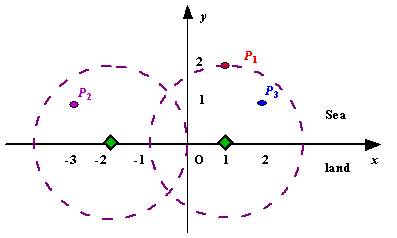poj1328雷达设置 贪心
Radar Installation
Description
Assume the coasting is an infinite straight line. Land is in one side of coasting, sea in the other. Each small island is a point locating in the sea side. And any radar installation, locating on the coasting, can only cover d distance, so an island in the sea can be covered by a radius installation, if the distance between them is at most d.
We use Cartesian coordinate system, defining the coasting is the x-axis. The sea side is above x-axis, and the land side below. Given the position of each island in the sea, and given the distance of the coverage of the radar installation, your task is to write a program to find the minimal number of radar installations to cover all the islands. Note that the position of an island is represented by its x-y coordinates.

Figure A Sample Input of Radar Installations
We use Cartesian coordinate system, defining the coasting is the x-axis. The sea side is above x-axis, and the land side below. Given the position of each island in the sea, and given the distance of the coverage of the radar installation, your task is to write a program to find the minimal number of radar installations to cover all the islands. Note that the position of an island is represented by its x-y coordinates.

Figure A Sample Input of Radar Installations
Input
The
input consists of several test cases. The first line of each case
contains two integers n (1<=n<=1000) and d, where n is the number
of islands in the sea and d is the distance of coverage of the radar
installation. This is followed by n lines each containing two integers
representing the coordinate of the position of each island. Then a blank
line follows to separate the cases.
The input is terminated by a line containing pair of zeros
The input is terminated by a line containing pair of zeros
Output
For
each test case output one line consisting of the test case number
followed by the minimal number of radar installations needed. "-1"
installation means no solution for that case.
Sample Input
3 2 1 2 -3 1 2 1 1 2 0 2 0 0
Sample Output
Case 1: 2 Case 2: 1
这道题目与下面的题目有异曲同工之妙
【贪心】雷达问题
题目描述
张琪曼等人用时空雷达定位李旭琳所在的空间位置。如图7.3所示,时空雷达装在一条直线上,直线上方是空间海洋,每个人在空间海洋的位置就如同大海中的岛屿,这些人的位置已知,每一个雷达的扫描范围是一个半径为d的圆形区域,问最少需要多少个雷达覆盖所有的人(岛屿)。
输入
输入包括多组测试数据,每组测试数据第一行为两个整数n (1≤n≤1000) 和 d,即岛屿数和雷达扫描半径。随后n行每行两个整数表示岛屿坐标。每组测试数据以空行间隔,所有测试数据以0 0结束。
输出
输出最少需要安装雷达数,每组一行。若无解以-1表示。
本想用以点为原点,R为半径x轴的与左端点排序,扫一遍就好了,然而突然想到一种情况,会使左端点满足情况,但右端点不满足。所以要更新右端点。

#include <iostream> #include <algorithm> #include <cmath> #include <cstdio> using namespace std; const int maxn = 1005; struct uct { double left, right; }; bool cmp(uct a, uct b) { return a.left < b.left; } int main() { ios::sync_with_stdio(false); uct s[maxn]; int k = 0, n, R; while(cin >> n >> R) { int flag = 1; if(n == 0&& R == 0) break; for(int i = 0; i < n; i++){ int x, y; cin >> x >> y; if(abs(y) <= R){ double len = sqrt((R*R - y*y)*1.0); s[i].left = x - len; s[i].right = x + len; }else flag = 0; //cout << i <<" " <<x <<" " <<y << endl; } if(flag) { sort(s, s+n, cmp); int cnt = 1; double ends = s[0].right; for(int i = 0; i < n; i++){ if(s[i].left > ends){ ends = s[i].right; cnt++; }else if(s[i].right < ends){ ends = s[i].right; } } cout << "Case " << ++k << ": " << cnt << endl; } else cout << "Case " << ++k << ": " << -1 << endl; } return 0; }


